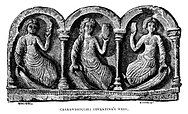Vates
| Part ofa serieson |
| Celtic mythologies |
|---|
 |
In modern English, the nounsvates(/ˈveɪtiːz/) andovate(UK:/ˈɒvət,ˈoʊveɪt/,US:/ˈoʊveɪt/), are used as technical terms for ancient Celticbards,prophets and philosophers. The terms correspond to aProto-Celticword which can be reconstructed as *wātis.[1]They are sometimes also used as English equivalents to later Celtic terms such asIrishfáith"prophet, seer".
History of terminology[edit]
The terminology discussed in this article relates to an Old Celtic word which can be reconstructed as *wātis.This word is not directly attested, but is inferred from renderings into Greek and Latin and from its descendants in later Celtic languages.
Vatesin English is a borrowing of a Latin nounvātēs(pronounced[ˈwaːteːs]), "prophet, poet". This Latin noun was either a cognate of Celtic *wātis(in which case the two words were descended from a commonItalo-Celticorigin),[2][3]or else aloanworddirectly from Celtic.[1]Despite being borrowed from the Latin form, the English word is generally used to refer to ancient Celtic seers rather than Roman ones.
Ovatein English is a borrowing and adaptation of a Greek rendering of the same Celtic term *wātis,first attested in the work of the Ancient Greek writerStrabo.Strabo rendered the Celtic term in Greek in the plural asouáteis(οὐάτεις,Koine:[uáːtiːs]).[1][4]The English wordovateis pronounced the way it is due to a misunderstanding of how the Greek word was pronounced.
Proto-Celtic *wātisdeveloped in medievalIrishasfáith"prophet, seer". Less directly, it is related togwawd"panegyric" inWelsh.[1][4]
Celticwātisis widely thought to have cognates in the Germanic languages, such as the Gothic termwods"possessed"[3](thoughLudwig Rübekeil2003 has suggested that the name of theCommon Germanic deity*Wōđinazmay in fact be an early loanword, an adjective*vatinosbased on Celticvates).
If the Celtic word *wātis,the Latinvates,and similar Germanic words are cognates rather than borrowings, they can be derived from anIndo-Europeanword*(H)ueh₂t-i-"seer".[3]
Virgiluses the Latinvannus"winnowingbasket "(conceivably from*wat-nos,compareOld High Germanwadal,modern GermanWedel,with the same meaning, from*wat-lo-) for something carried about in theBacchicfestival, suggesting that the root may have had anecstaticsense in Italic also. The likelihood of this etymology and its relevance to the wordvatesis, however, doubtful.[3]
"Ovate" is used as a direct translation of the Welsh wordofydd(derived from the Roman poet Ovid)[5]and it is also plausible thatovateis derived fromofydd.
History of the institution[edit]
Ancient Rome[edit]
The earliest Latin writers usedvatesto denote prophets and soothsayers in general; the word fell into disuse in Latin until it was revived byVirgil.[6]ThusOvidcould describe himself as thevatesofEros(Amores3.9).
In pagan Rome the vates resided on the Vatican Hill, the Hill of the Vates. The Vatican Hill takes its name from the Latin word Vaticanus,a vaticiniis ferendis[clarification needed],in allusion to the oracles, orvaticinia,which were anciently delivered on the Vatican Hill.[7](When the papacy was returned to Rome fromAvignon(France) in the 14th century, the Vatican became the residence of the Pope, and the word Vatican came to refer to the enclave in the middle of Rome that had become the seat of the Roman Catholic Church.[8])
Celtic civilisation[edit]
According to the ancient Greek writersStrabo,[9]Diodorus Siculus,[9]andPoseidonius,thevates(οὐάτεις) were one of three classes ofCelticpriesthood, the other two being thedruidsand thebards.The Vates had the role ofseersand performedsacrifices(in particular administeringhuman sacrifice) under the authority of a druid according to Roman and Christian interpretation.
Modern usage[edit]
Thomas Carlylediscussed the similarities and differences between the "VatesProphet "and the"VatesPoet "inOn Heroes, Hero-Worship, & the Heroic in History(1841).[10]
VatesorOvatesmake up one of the three grades of theOrder of Bards, Ovates and Druids,aneo-druidismorder based inEngland.
An ovate is also the initial level one can attain in the modern WelshGorseddof Bards. The Gorsedd is not a neo-druidic entity like the one mentioned above, but is more concerned with Welsh arts and culture; however, the ceremony and practices are largely based on reimaginings of druidism byIolo Morganwg.
Citations[edit]
- ^abcdBernhard Maier,Dictionary of Celtic Religion and Culture,trans. by Cyril Edwards (Woodbridge: Boydell, 1997), p. 278 [s.v.vates] [first published asLexikon der keltischen Religion und Kultur(Stuttgart: Kröner, 1994).
- ^Arnaud Fournet, 'About the Ethnolinguistics of Gaulish People: The Case for a Kartic Substrate',The Macro-Comparative Journal,2.1 (2011), 1-15 (p. 8).
- ^abcdMichiel de Vaan,Etymological Dictionary of Latin and the Other Italic Languages,Leiden Indo-European Etymological Dictionary Series, 7 (Leiden: Brill, 2008), p. 656 [s.v.vātēs, -is].
- ^ab"Ovate, n.1."OED Online,Oxford University Press, December 2018, oed /view/Entry/134224. Accessed 7 December 2018.
- ^University of Wales Dictionary
- ^"Vates".Archived fromthe originalon 2005-11-25.Retrieved2005-04-29.
- ^Sources: Compendious Description of the Museums of Ancient Sculpture, Greek and Roman, in the Vatican Palace, by Cav. H. J. Massi, First Curator of the Vatican Museums and Galleries, Paleographer and Professor of the Italian and French Languages, Rome, Third Edition, 1889, Title page, page 7.
- ^Lo Bello, Nino (1998).Incredible Book of Vatican Facts and Papal Curiosities.Liguori Publications. p. 135.ISBN0-7648-0171-6.
- ^abOvates or Vates: The Shamans
- ^Carlyle, Thomas (1841)."Lecture III. The Hero as Poet. Dante: Shakspeare.".On Heroes, Hero-Worship, and the Heroic in History.
General and cited sources[edit]
- Ellis, Peter Berresford,The Druids,William B. Eerdmans Publishing (1995)ISBN0-8028-3798-0
- Perkins, Caroline A., "Ovid's Erotic Vates"inHelios,March 2000
- Rübekeil, Ludwig,Wodan und andere forschungsgeschichtliche Leichen: exhumiertArchived2005-02-19 at theWayback Machine,Beiträge zur Namenforschung (2003), 25–42.

